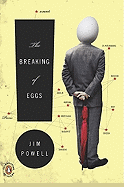
 Feliks Zhukovski has lived in the same Paris apartment for decades without really knowing the landlady who lives across the hall. He has written and published an annual tourist guidebook to the countries of the Eastern Bloc for as many years as he has lived in that apartment. His daily life has been admirably predictable, the same year in and year out. In Jim Powell's thoroughly engaging debut novel, we meet Feliks at the beginning of 1991, when the U.S.S.R. has collapsed, the Berlin Wall has been rubble for more than a year and a wave of change is sweeping former Eastern Bloc countries. At the age of 61, Feliks realizes in shock, "For my whole adult life, I had subscribed to an ideology that advocated change, radical change, as the solution to society's problems. Yet I did not welcome change in my own life. I resisted it."
Feliks Zhukovski has lived in the same Paris apartment for decades without really knowing the landlady who lives across the hall. He has written and published an annual tourist guidebook to the countries of the Eastern Bloc for as many years as he has lived in that apartment. His daily life has been admirably predictable, the same year in and year out. In Jim Powell's thoroughly engaging debut novel, we meet Feliks at the beginning of 1991, when the U.S.S.R. has collapsed, the Berlin Wall has been rubble for more than a year and a wave of change is sweeping former Eastern Bloc countries. At the age of 61, Feliks realizes in shock, "For my whole adult life, I had subscribed to an ideology that advocated change, radical change, as the solution to society's problems. Yet I did not welcome change in my own life. I resisted it."
One shock after another will greet Feliks in 1991 as he comes to know himself and his history more fully. He was born in Lodz, Poland, in 1930 and lived there until August 1939, when his mother sent him and his brother to stay with an aunt in Switzerland; after World War II, he relocated to France and eventually became a French citizen. Aside from those objective facts and his lapsed membership in the Communist Party, he is undefined and adrift in a landscape demanding new definitions and focus. Can he remain frozen in a past quickly vanishing?
As it turns out, Feliks's journey through 1991 is very complicated (in a supremely satisfying way) and overflows with people who challenge his previous assumptions. Feliks might fight new knowledge and his need to adjust at every step of the way, but slowly he sees that he was very wrong at the time he left Switzerland for France to think that "unlike other people, I had no history, that here I was aged 17 starting life altogether afresh with no home, no family and no past." As he gradually learns to listen (and to "hear"), he finds that he had willed himself into historical denial and shares more with the people around him than he ever knew. Everyone coming out of the war, it appears, adopted a personal survival strategy, whether it was denial, self-deception or a disciplined reticence. His landlady, in a rare revealing moment, confides, "We still cannot talk about these things here. We never will. When my generation dies, all this will die with us." Such confidences about being weighed down by history are not offered lightly; they are lifelines thrown out to those in need to move forward with life after having endured the unbearable.--John McFarland
Shelf Talker: A moving and satisfyingly complex novel about coming to terms with personal history and identity in a post-World War II Europe.

